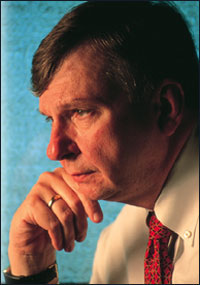|
Chairman and Stuart McGuire Professor of Surgery
Department of Surgery, School of Medicine
E-mail: ronald.merrell@vcu.edu
www.surgery.vcu.edu/gen-rcm.htm
What drew you to the life
sciences and why did you choose your specific field?
Living systems
combine physics, chemistry, and mathematics to make something which
is dynamic, evolving, self-sustaining and the greatest challenge
to the intellect to understand and manage. I have always been attracted
to life science since high school science fairs! My specific field
of surgery involves a physical engagement with our questions and
problems
in life science as we actually grasp the disease and attempt to
remove it, or modify living tissue in repair or replacement. As a
very bad
pianist I enjoyed manual challenges and perhaps I am thereby a
better surgeon. My research work in telemedicine and space medicine
involves
management of medical situations at distance through telecommunications
and robotics. I was attracted to this set of problems from a love
for technology and a belief that distance should not determine outcome
in the treatment of disease. You should have the same advantage
of
medical care no matter where you live or who you are.
Why did you
decide to go beyond the lab into the classroom to teach?
Hmmm. I
have been
in a university environment almost all my life. I never thought
of exploring scientific matters outside the context of teaching.
What
is your philosophy of teaching? How do you teach and why do
it that way?
I want my students to use science as a way to logically
deal with the unknown.
This
is different
from using science as some enormous database of answers. I
hope students will share my respect for the questions over
the temporary
answers
we get in science. My philosophy of teaching is to empower
students with new knowledge and the ability to seek their own
knowledge
in future.
What is it you want your students to leave your
class with after it’s
all over?
A sense of wonder at the beauty and knowable detail
of living systems.
What do you want students who may be interested
in any of the life
sciences to know?
You can be a life scientist!! there is ample room
and the problems are legion.
What do you get out of teaching?
A
sense that perhaps the continuum of science has been made more
likely.
Do you learn anything from your students?
Students lack the burden of all the negative data and failed experiments,
which can drag on an investigator in considering new approaches.
Student questions come out of the blue and can be fresh insight
I never consider or left behind inappropriately. Students give me
courage and hope.
What do
you do in your “free” time?
Read fiction, enjoy music, travel.
back to top
|





 Ronald
Merrell, M.D., F.A.C.S.
Ronald
Merrell, M.D., F.A.C.S.